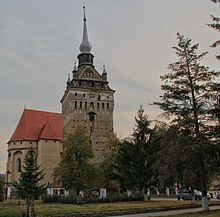Saschiz fortified church
| Saschiz Fortified Church Biserica fortificată din Saschiz |
|
|---|---|
 |
|
| Basic information | |
| Location | Saschiz, Romania |
| Geographic coordinates | 46°11′39″N 24°57′37″E / 46.194074°N 24.960175°ECoordinates: 46°11′39″N 24°57′37″E / 46.194074°N 24.960175°E |
| Affiliation | Lutheran |
| Country | Romania |
| Architectural description | |
| Architectural type | Fortified church |
| Architectural style | Gothic |
| Groundbreaking | 1493 |
| Completed | 1496 |
| Official name: Villages with fortified churches in Transylvania | |
| Type | Cultural |
| Criteria | iv |
| Designated | 1993 (17th session) 1999 (23rd session – Extension) |
| Reference no. | 596 |
| State Party | Romania |
| Region | Europe and North America |
| Type | architectural |
| Reference no. | LMI Code: MS-II-a-A-15782 (RAN Code: 119215.02.01) |
The Saschiz fortified church (Romanian: Biserica fortificată din Saschiz; German: Kirchenburg von Keisd) is a Lutheran fortified church in Saschiz (Keisd), Mureș County, in the Transylvania region of Romania. It was built by the ethnic German Transylvanian Saxon community at a time when the area belonged to the Kingdom of Hungary. Initially Roman Catholic, it became Lutheran following the Reformation. Together with the surrounding village, the church forms part of the villages with fortified churches in Transylvania UNESCO World Heritage Site.
Construction of a large fortified late Gothic church began in 1493 on the site of a Romanesque basilica, and the main structure was completed in 1496. The church was dedicated to Saint Stephen of Hungary. A few payments from the authorities at Sibiu for building the church survive; these date from 1494 to 1525. From 1503 to 1507, the village received a Papal indulgence upon the request of a parishioner, and was no longer obliged to quarter troops or send provisions to the army of the Kingdom of Hungary.
...
Wikipedia
